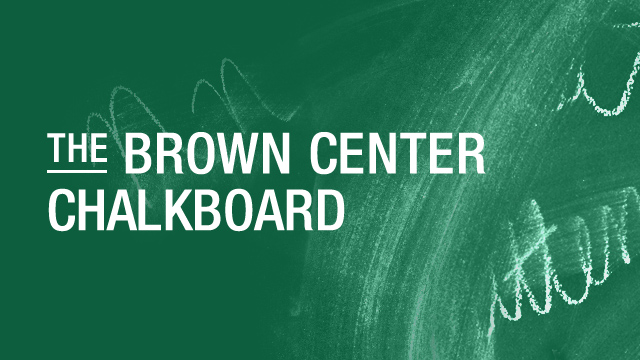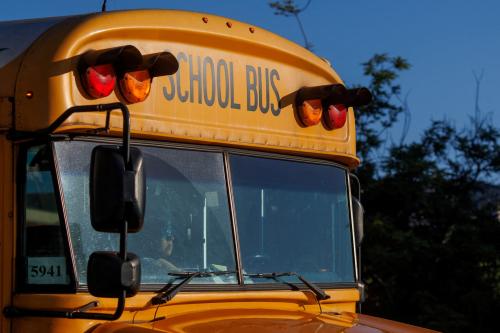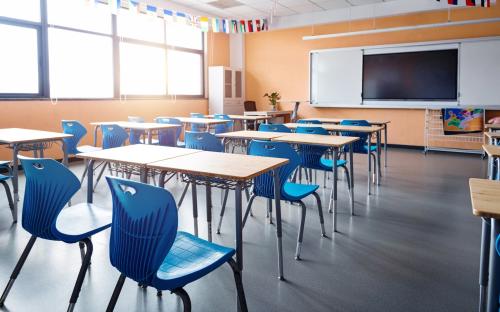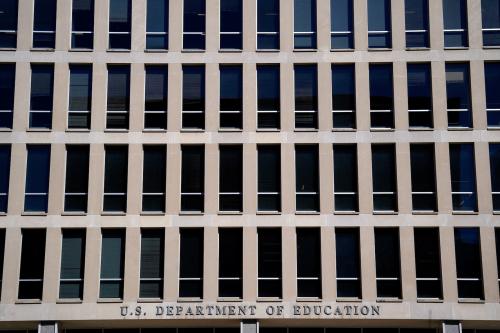As we come to the end of another brutal campaign season, most Americans’ attention remains fixed on the U.S. presidential election. We in the Brown Center have watched with interest as education topics have entered the Harris-Trump race, from Kamala Harris selecting a former teacher as her running mate to Donald Trump continuing to talk about dismantling the U.S. Department of Education. Still, even as voters name education among the most important issues in this presidential race, other issues—such as immigration, abortion, and the economy—have drawn more media attention.
Of course, there’s a lot more on Americans’ ballots this November than the names of presidential candidates. We checked in with scholars in the Brown Center to get their insights and reactions to some of the key education issues in front of voters.
Voters weigh in on private school vouchers
I’ll be watching several state ballot initiatives with implications for private school choice programs. A recent wave of state programs that allow families—including wealthy families—to use public funds to pay for private schooling have, rightfully, attracted a lot of attention. Critics argue these programs are hostile to public schools, violate norms of anti-discrimination and church-state separation, have little empirical support, and exacerbate opportunity gaps.
In Kentucky, voters will decide on Amendment 2, which would add a clause to the state constitution that allows the legislature to fund private schools. The amendment requires only a simple majority to pass, and if it does, analysts believe the state could move quickly to create a large-scale voucher program. In Colorado, voters will decide on Amendment 80, which would enshrine a “constitutional right to school choice” with a 55% vote in favor. The amendment’s wording has been a source of conflict and confusion. (Utah voters were poised to vote on an amendment that also raised concerns about wording, but Utah’s Third District Court voided that ballot question, at least for now.) Meanwhile, in Nebraska, voters will decide by simple-majority vote whether to eliminate private school choice funding. Referendum 435 would repeal 2024 legislation that provided $10 million annually to the state treasurer to administer a scholarship program.
Opponents of large-scale voucher programs will be cheering for “no” votes in Kentucky and Colorado, and a “repeal” vote in Nebraska. Historically, voters haven’t responded favorably to ballot initiatives that provide public funding for private schools. We’ll find out whether the same holds true now that school vouchers are more directly in the spotlight.
A referendum on standardized assessments in education
On the ballot in Massachusetts is a measure about whether the state will continue to require students to pass the 10th grade Massachusetts Comprehensive Assessment System (MCAS) exams in English, mathematics, and science (as they have since 2003). Most students pass the MCAS their first time; the majority of those that don’t eventually pass or successfully appeal a failing MCAS grade. Only 1.8% of students in the class of 2019 were barred from receiving a high school diploma because of their MCAS testing (and instead received a certificate of attainment). The test is highly correlated with longer-term outcomes, such as college attendance and graduation, though opponents to the testing requirement voice concerns the tests do not fully capture students’ skills or are too stressful for students. Even within the same political party, Massachusetts politicians have divergent views on the ballot measure.
I’m watching the decision in Massachusetts because it feels like an inflection point on the role of standardized tests in students’ educational progress. Massachusetts is one of only eight states that require students to take and pass a subject-specific exam in high school to receive a diploma, down from the height of the No Child Left Behind accountability era when more than half of the states required students to pass exams for graduation.
Post-pandemic, there have been varied trends in standardized testing at other crucial education junctures. For example, 16 states and the District of Columbia require grade retention for third graders who don’t pass standardized assessments, though the large number of students failing those exams has raised questions about the feasibility of implementing those retention policies. In higher education, nearly all colleges waived admissions test requirements during the pandemic. Over the past couple years, some colleges have reinstated requiring test scores while others have permanently gone test-optional. Schools pursuing both approaches argue their policy advances equity in admissions. The Massachusetts ballot initiative will provide useful information on whether the public is interested in a shift away from standardized tests or continuing to use high-stakes testing for education decisions.
National attention on teacher compensation has fizzled
Increasing public teacher salaries no longer seems to be an urgent policy priority, neither at the federal level nor in most states. That’s what I conclude based on the lack of debate on the issue during this election season. The silence has surprised me, given the public attention devoted to the topic since the pandemic and the accompanying concerns over teacher burnout and shortages. After all, it was just in early 2023 when momentum around the American Teacher Act’s proposed $60,000 minimum was picking up. Yet, this has not converted to attention in 2024: Both major-party presidential candidates have largely ignored the issue (after making a few token statements about teachers and their pay). For Harris, this inattention to teacher pay raises is a reversal from her 2020 presidential run where her campaign promise to boost the average teacher’s pay by 23% was a key plank in her platform.
Teacher pay has attracted significant attention in just a few states. For example, Indiana gubernatorial candidate Jennifer McCormick (D) previously served as the state superintendent, and education is a key part of her platform, including a promise for a $60,000 minimum teacher salary. In North Carolina, both candidates in the open race for governor, Josh Stein (D) and Mark Robinson (R), have endorsed further increases in teacher pay, on the heels of a three percent pay raise enacted in the state earlier this summer. The issue has also come up in the New Hampshire gubernatorial race.
The lack of broader interest on teacher pay raises may indicate that recent state-level legislative actions have been enough to make progress on the issue and lower the temperature on widespread demand for reforms. Based on my tabulations, 15 states have enacted policies raising teacher salaries either this year or last—11 of which were states that were in the bottom half of average teacher pay rankings, according to the National Education Association. And in 2018, multiple states saw teacher strikes and consequently took action on pay raises during the “RedForEd” movement—again, many were among the lowest-paying states at the time.
Focusing compensation reform at the state level is for the best, in my view, as state actors can simultaneously balance pay against other competing demands like school staffing levels, retirement and benefit costs, and consider them in concert with other needed teacher compensation reforms. I’m not saying that these actions on teacher pay in recent years have been sufficient to fully shore up the faltering teacher pipeline; judging by long-term trends, I suspect we still have a long way to go. But changes to date offer reason for optimism, despite the lack of discourse in most races.
-
Acknowledgements and disclosures
Analisa Pines and Alex Hubbard contributed to this piece.
The Brookings Institution is committed to quality, independence, and impact.
We are supported by a diverse array of funders. In line with our values and policies, each Brookings publication represents the sole views of its author(s).










Commentary
What Brookings education scholars will be watching on Election Day
November 5, 2024